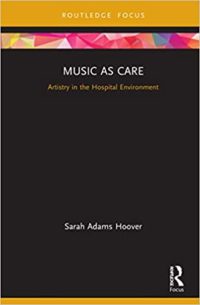
Music as Care by Sarah Adams Hoover is a book devoted to “arts in health.” The topic is light years from my area of expertise so I was surprised when Sarah asked me to take a look at it. I am extremely glad she did.
The book provides an excellent (and fascinating) overview of a rapidly growing field, one that appears to hold much promise for the future of healthcare. But what struck me most was the way it humanizes music; for the arts to be effective in healthcare settings artists, healthcare providers, and patients must respect each other, listen to each other. The perspective of each must be incorporated in designing the plan of care. As one small example, consideration of the musicians’ responses both to the context in which they perform and to the space in which they do so becomes important.
Arts organizations that preserve the European aristocratic cultural tradition have placed “art” so much at the center of the enterprise that the human experience of visual artists/performers and preceivers is not even an afterthought, and this is the root source of most of the problems that the arts face today. Music as Care brings the experience of the music maker and the music listener to the fore in ways that I have seldom seen elsewhere. It is an excellent (and necessary) antidote to the “superiority complex [so] deeply embedded in classical music culture . . . .” (102, quoted from Lawrence W. Levine, Highbrow/Lowbrow: The Emergence of Cultural Hierarchy in America.)
For a community engagement advocate, large portions of the “how to/best practices” sections of the book read like a prescription for effective engagement if you simply change the context from healthcare to community. Beginning with “a ‘simple commitment to genuine respect, real interest, and heartfelt care’” (92 quoted from Eric Booth, “The Citizen Artist: A Revolution of the Heart within the Arts.”) the book presents an outstanding list of preparatory work. I’m not presenting the whole list, but see how well these excerpts describe good practice in community engagement (emphases mine):
Before You Start:
Preparing for a potential project in a healthcare setting
- Make an inventory of assets in hand . . . .
- . . . . How will you build trust and respect with a potential partner?
- How will you ensure that your activities and relationships are responsive to the cultures you hope to serve with your music?
- . . . . What will you need to learn in advance in order to empathize with voices unlike your own . . .?
- How will you determine if music is needed or welcome in a given situation?
- What is a reasonable scale and scope for the project?
- . . . . How can you ensure there will be an experience of authentic collaboration?
- . . . . What are your partner’s goals and outcomes?
- If things don’t go well, what repercussions could there be for your partnering organization . . . ?
- How will you . . . evaluate the experience? . . . .
(P. 103, Music as Care)
Music as Care is not designed as an exploration of community engagement in the arts but it offers a perspective that can be invaluable for anyone who is interested in relationship building in the arts.
Engage!
Doug
